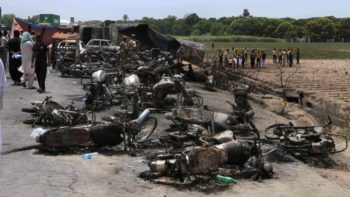
Pakistan on Friday ordered Shell Pakistan to pay at least $2.4 million in compensation after more than 200 people were killed when one of its tankers overturned and exploded in a devastating inferno last month.
The tanker contracted by Royal Dutch Shell’s local subsidiary crashed on a main highway in central Punjab province while carrying some 50,000 litres of fuel from Karachi to Lahore on June 25.
It exploded minutes later, sending a fireball through crowds from a nearby village who had gathered to scavenge for the spilled fuel, despite warnings by the driver and police to stay away.
Health officials and police Friday put the death toll, which has continued to rise since the accident, at 218 people and said 38 victims were still in hospital, some in critical condition.
“OGRA (the Oil and Gas Regulatory Authority) has found Shell Pakistan responsible for the oil tanker incident and imposed a fine of 10 million rupees ($100,000 dollars) on it,” authority spokesman Imran Ghaznavi told AFP.
“Shell Pakistan has also been ordered to pay one million rupees compensation to the families of each deceased and 500,000 rupees for each of the injured,” he added.
That would require Shell pay at least $2.48 million to the families of the dead so far. It was not immediately clear how many wounded would receive compensation, or if the death toll might continue to increase.
Ghaznavi said OGRA had sent a list of 21 questions to Shell Pakistan about the accident but had not yet received an answer.
OGRA’s investigation found that Shell never checked if the private tanker it had hired complied with safety standards, according to a report seen by AFP.
The report said that Shell had informed the authority previously that its lorries met technical standards and that they upgrade contracted vehicles, but the tanker involved in the accident had four axles instead of the five recommended to carry such a load.
The report also claimed the tanker’s fitness certificate was “fake”, and that Shell Pakistan “failed to provide the pre-loading checklist”.
It lambasted Shell Pakistan’s emergency response as “casual”.
OGRA ordered all oil companies in Pakistan to fully implement safety standards, organise training for drivers to deal with emergencies and spills, and do regular medical checkups.
It also asked them to organise awareness campaigns through mass media warning people about dangers in case of accidents and spills and called on local emergency services and police to review their response.
In response to questions by AFP, a Shell Pakistan spokesperson said that the company was still investigating the incident.
“Shell Pakistan is presently reviewing the Oil and Gas Regulatory Authority Investigation report in detail.
“It would be unhelpful to speculate on factors that may have contributed to the incident whilst other investigations are still ongoing, but we respect the role of the regulator and will consider the report as we cooperate with investigations by authorities and as we conduct our own investigation,” the spokesperson said.
